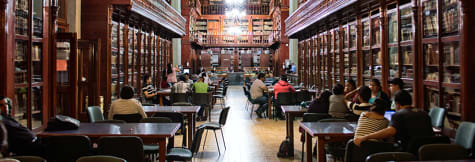The USA is well-established as the world’s most popular international study destination. In fact, over 830,000 foreign students enrol on American degree programmes – that’s about the same number of foreign students studying in the next two most popular countries (the UK and France) combined!
Of course, the USA is also quite a bit bigger than the UK and France (around ten times bigger, in fact) so it’s not hard to see why it attracts such a substantial number of people looking for a compelling and fulfilling study abroad experience. With 50 states, four different time zones (six if you include Alaska and Hawaii) and almost 4,000 higher education institutions, it’s safe to say that no two US study abroad experiences will be quite the same.
That said, this guide will attempt to provide some helpful information for prospective students who might be thinking of living in the USA as a Masters student. It’s impossible to be entirely comprehensive, but the sections below will provide important information on accommodation and living costs, working in the USA as a postgraduate student, and a brief introduction to culture, leisure and everyday life for international students in America. If you’d like to learn about US Masters programmes, funding opportunities and visa regulations, take a look at other parts of our guide to studying a Masters in the USA.
Culture, leisure and everyday life for Masters students in the USA
The global success of American media means that you might travel to the USA with a few pre-formed expectations. However, despite what you may have seen on TV, most Americans don’t live out their entire social lives in coffee shops.
On the other hand, you'll probably find that some of the more positive stereotypes about American attitudes are generally true. Americans on the whole are a little less reserved than many Europeans and will happily greet and chat with strangers. Many will also be genuinely interested in your background as an international student and will be proud to welcome you to their country and its education system.
American cuisine
If your ideas about American dining have been filtered through international fast food franchises you may be surprised at the quality and diversity of options on offer. After all, American culture is a fusion of a huge range of influences and this is no more evident than in its food and drink. Many of the traditions brought over by different generations of European settlers and immigrants have gone on to become the basis of diverse cuisines – from Italian-American dishes such as the ‘deep-pan’ pizza, to the New England boiled dinner, or the famous hot dog (derived from a German original). Other American foods take advantage of the country’s own resources, from New England clam chowder, to the turkey that forms the basis of the traditional Thanksgiving meal, or the pecan pie served in Southern states.
Like other aspects of American culture and daily life, food and drink also vary quite significantly between different states. Wherever you end up studying, make sure you take the time to try the local specialities – your fellow students will probably be more than happy to point out what’s good!
American attitudes to alcohol
One thing worth bearing in mind as an international student in the USA is that American attitudes to alcohol can be very different to those in Europe or elsewhere. Though the prohibition of alcohol across America ended in 1933, many parts of the country still restrict the manufacture and sale of intoxicating beverages.
Make sure you understand the law in your host state and county, but also take account of local attitudes to drinking. Even if alcohol is freely sold in your area, you may find that casual, social, drinking is less frequent. Your university campus is also likely to ban the consumption of alcohol on its premises and may respond very strictly to any offences against its regulations – including ending or suspending your student status (which may invalidate your visa). Bear in mind too that the minimum drinking age in America is 21 and this is strictly enforced.
On the whole, you should be sensitive to local attitudes. If your fellow students suggest visiting a bar to celebrate a successful piece of work, go for it! But don’t be surprised if, on the whole, your friends and colleagues drink a little less than at home.
American public holidays
America celebrates a range of local and federal (national) public holidays, many of which derive from significant events in the country’s history or provide a way for regional communities to remember and celebrate their cultural origins. Federal holidays are particularly important and vibrant events in the US calendar.
Independence Day
Independence Day (also known as ‘the Fourth of July’ or ‘July Fourth’) celebrates the original US Declaration of Independence, which occurred on (you guessed it) the 4th of July, 1776. Independence Day is a federal holiday and most non-essential businesses and services will be closed. Instead, Americans focus on celebrating and enjoying themselves!
It’s quite likely that your university and host community will hold public events to mark the occasion, and if so you should absolutely get involved. Few countries do national celebration quite like America and your local friends and colleagues will be very happy to share the occasion with you and explain its significance.
Thanksgiving
Thanksgiving is another national holiday, traditionally celebrated on the fourth Thursday in November. Unlike Independence Day, which is celebrated in public, Thanksgiving is usually celebrated by family and friends in the home. Traditionally, the holiday marks a feast held by original pilgrim settlers, together with indigenous peoples. It’s quite possible that other students or acquaintances may invite you to a Thanksgiving meal. If so you should treat the invitation with gratitude and respect and try to attend.
The customary Thanksgiving meal is a turkey dinner and guests often prepare and bring side dishes – it’s worth asking if you can help with this. In its traditional form Thanksgiving is also a religious occasion in the Christian tradition, giving thanks to God for the American nation and its providence. Many people now celebrate in a secular manner, but it is polite to observe the saying of grace if this is included as part of a meal you attend.
Accommodation and living costs for Masters students in the USA
The cost of living in the USA varies quite extensively between different states. As a rule, you can expect prices to be more expensive on the West and East coasts, with Southern and Midwestern states being more affordable. This is only a very general observation, however. The best way to get an estimate of the cost of living as a Masters student in the USA is to look at resources offered by your university. Most American higher education institutes are used to providing advice to international students.
University accommodation
Most larger American higher education institutions will incorporate student dormitories (particularly if they cater to substantial cohorts of undergraduates), and some of this provision will usually be available to international students who might otherwise find it difficult to find suitable living arrangements before arriving.
The cost of a room in a student dormitory will vary between institutions and according to the facilities on offer, but most options will be cheaper than private alternatives. It’s quite common for American undergraduates to share rooms in dormitories and this may also apply to students on graduate programmes. If so, you will be informed in advance and most likely asked to participate in a matching service that will attempt to partner suitable students (in some cases international students or postgraduates may automatically be roomed together). Shared rooms will always be single-sex and your university will do its best to take account of any cultural or religious needs you might have.
Some larger universities may also offer individual accommodation, or shared housing designed specifically for international students. This will usually be more expensive than a shared room, but it might be worth considering if you would rather have a more personal space in which to study and relax. On the other hand, sharing a room can be a great way to meet other students and get involved in social activities at your university – particularly as an international student.
Private accommodation
If university dormitories are not available to you (or if you would prefer to have your own living space), you should still be able to find private rental accommodation near your campus. Most university towns and cities will have plenty of suitable housing available and your university may also keep a register of reputable local landlords. Finding a single room apartment may be more difficult than locating a shared house or apartment, so it’s a good idea to try and group up with other students. For this reason, private accommodation might be a better option in the second or subsequent years of your Masters programme, after you’ve had a chance to meet other people at your university and form friendships.
You can expect private accommodation to cost more than a dormitory room; your institution may be able to provide advice on prices in the local area. You should also make sure to factor in the cost of utilities for private accommodation (university dormitories are likely to include these in the rental price), as well as the expense involved in travelling to and from your campus.
Other living costs
It’s difficult to give an accurate figure for typical living costs across the entire USA – prices within individual states (and counties within states) differ based on a range of factors including local demographics, state taxation, product availability and infrastructure. Your own living costs and expenses will also differ considerably according to your lifestyle and interests.
As a rule, you can expect goods from supermarkets to be relatively affordable, but your best option may be to use the retail outlets and catering options provided by your university. These may be subsidised and are another good reason to consider living in campus dormitories.
One thing worth remembering while living as a Masters student in the USA, is that tipping is usually expected when paying for food or drink. You should normally tip around 15-20% for waiting staff and bartenders – local friends will be able to advise you if you are unsure.
Working while studying a Masters in the USA
US immigration regulations require all applicants for student visas to be enrolled on a full-time programme and, if necessary, to provide documents proving their ability to support themselves financially using existing resources or scholarships. This places some restrictions on working while studying a Masters in America. You will not be able to work substantial hours alongside your programme and any employment you do take should not be essential to meeting the cost of fees, accommodation and other basic living expenses. Your right to work as a student in the USA is also restricted by specific laws.
With an F-1 student visa, you will only be entitled to work on-campus during the first year of your programme. This will entitle you to take up an assistantship to help fund your studies, or to work part-time in campus services. In the second year of your programme you will be able to work off-campus, but only in areas related to your studies (for example, in appropriate teaching or technical roles). All off-campus work will need to be approved by your institution.
See the appropriate sections of our guide to Masters study in the USA for information on student visa regulations and funding opportunities.
Other useful information for Masters students in the USA
The size and scope of the USA makes it difficult to provide an absolutely comprehensive guide to what to expect when living there are a postgraduate student, but hopefully the information in this article is a helpful starting point.
Before you go, however, it’s worth quickly covering a few other important points about life in the USA, including healthcare and banking.
Healthcare in the USA
There is no national healthcare system in the US; instead, most citizens have private health insurance. As such, payment of any medical costs you incur while studying abroad in the USA will be your own responsibility. Your university may provide a medical centre on its campus offering affordable (or subsidised) treatment for basic conditions and ailments.
Hospital treatment can be very expensive, however, and you are therefore advised to consider taking out some form of personal health insurance policy. Your university should be able to provide some advice on this – indeed, some institutions may specify that international students possess health insurance. It’s therefore worth getting in touch with your university’s international office in advance, particularly if you have a pre-existing condition that may require treatment during the period of your Masters degree.
Banking in the USA
International students are eligible to open a bank account in the USA and you should do so to simplify payments from any employment or from any maintenance allowance awarded to you as part of a funding arrangement. Not all American banks are national, so bear this in mind if you are choosing a local bank and plan to travel during your Masters.
In most cases you will also be charged to withdraw money from another bank’s ATM services; the fee for this is small (around $2) but it can add up – try to pick a bank with plenty of outlets in your local area. For more information on banking as a Masters student in the USA, see the advice provided by the Fulbright Commission.
Search for a Masters in the USA
Ready to start looking for your ideal study abroad opportunity? Browse and compare Masters degrees in America on FindAMasters.com

 Continue with Facebook
Continue with Facebook








